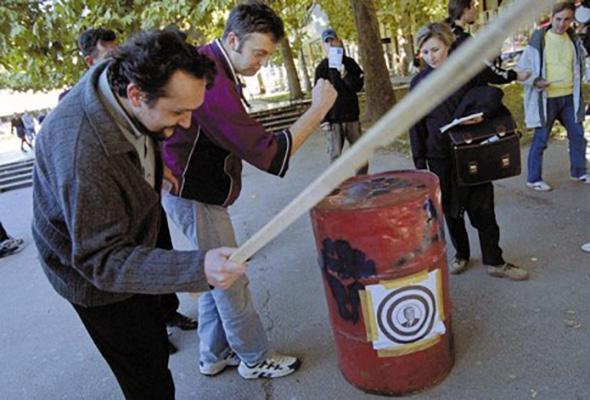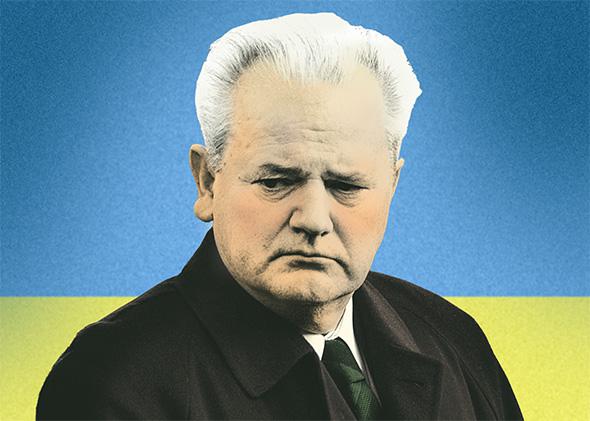Excerpted from Blueprint for Revolution: How to Use Rice Pudding, Lego Men, and Other Nonviolent Techniques to Galvanize Communities, Overthrow Dictators, or Simply Change the World, by Srdja Popovic. Out now by Spiegel & Grau.
It was early on in our efforts to take down Slobodan Milosevic, and like all novice activists, we had a moment of reckoning. Looking around the room at one of our meetings, we realized that we were a bunch of Serbian kids, and rather than focus on what we had going for us, we began obsessing about everything we didn’t have. We didn’t have an army. We didn’t have a lot of money. We had no access to media, which was virtually all state-run. The dictator, we realized, had both a vision and the means to make it come true; his means involved instilling fear. We had a much better vision, but we thought on that grim evening, no way of turning it into a reality.
It was then that we came up with the smiling barrel.
The idea was really very simple. As we chatted, someone kept talking about how Milosevic only won because he made people afraid, and someone else said that the only thing that could trump fear was laughter. It was one of the wisest things I’ve ever heard. As Monty Python skits have always been up there right with Tolkien for me, I knew very well that humor doesn’t just make you chuckle—it makes you think. We started telling jokes. Within an hour, it seemed to us entirely possible that all we really needed to bring down the regime were a few healthy laughs. And we were eager to start laughing.

Photo courtesy Srdja Popovic
We retrieved an old and battered barrel from a nearby construction site and delivered it to our movement’s “official” designer—my best friend, Duda, a designer—and asked him to draw a realistic portrait of the fearsome leader’s face. Duda was delighted to help. When we came back a day or two later, we had ourselves Milosevic-on-a-barrel, grinning an evil grin, his forehead marked by the barrel’s numerous rust spots. It was a face so comical that even a 2-year-old would have found it amusing. But we weren’t done. We asked Duda to paint a big, pretty sign that read “Smash his face for just a dinar.” That was about two cents at the time, so it was a pretty good deal. Then we took the sign, the barrel, and a baseball bat to Knez Mihailova Street, the main pedestrian boulevard in Belgrade. Right off Republic Square, Knez Mihailova Street is always filled with shoppers and strollers, as this is where everyone comes to check out the latest fashions and meet their friends for drinks in the afternoons. We placed the barrel and the sign smack in the middle of the street—right at the center of all the action—and hastily retreated to, the Russian Emperor, a nearby coffee shop, to watch.
The first few passersby who noticed the barrel and the sign seemed confused, unsure what to make of the brazen display of dissidence right there in the open. The following 10 people who checked it out were more relaxed; some even smiled, and one went as far as picking up the bat and holding it for a few moments before putting it down and quickly walking away. Then, the moment we’d been waiting for: A young man, just a few years younger than us, laughed out loud, searched his pockets, took out a dinar, plopped it into a hole on top of the barrel, picked up the bat, and with a gigantic swing smashed Milosevic in the face. You could hear the solid thud reverberate five blocks in each direction. He must have realized that with the few remaining independent radio and newspapers of Belgrade criticizing the government all the time, one dent in a barrel wasn’t going to land him in prison. To him, the risk of action was acceptably low. And once he took his first crack at Milosevic’s face, others started to realize that they too could get away with it. It was something between peer pressure and a mob mentality. Soon curious bystanders lined up for a turn at bat and took their own swings. People started to stare, then to point, then to laugh. Before long some parents were encouraging their children who were too small for the bat to kick the barrel instead with their tiny legs. Everybody was having fun, and the sound of this barrel being smashed was echoing all the way down to Kalemegdan Park. It didn’t take long for dinars to pour into the barrel and for poor Duda’s artistic masterpiece—the stern and serious mug of Mr. Milosevic—to get beaten into unrecognizability by an enthusiastic and cheerful crowd.
As this was happening, my friends and I were sitting outside at the café, sipping double espressos, smoking Marlboros, and cracking up. It was fun to see all these people blowing off steam with our barrel. But the best part lay ahead.
It came when the police arrived. It took 10 or 15 minutes. A patrol car stopped nearby and two pudgy policemen stepped out and surveyed the scene. This is when I came up with my beloved “Pretend Police” game. I played it for the first time at the café that day. The police’s first instinct, I knew, would be to arrest people. Ordinarily, of course, they’d arrest the demonstration’s organizers, but we were nowhere to be found. That left the officers with only two choices. They could arrest the people lining up to smack the barrel—including waiters from nearby cafés, good-looking girls holding shopping bags, and a bunch of parents with children—or they could confiscate the barrel itself. If they went for the people, they would cause an outrage, as there’s hardly a law on the books prohibiting violence against rusty metal cylinders, and mass arrests of innocent bystanders is the surest way for a regime to radicalize even its previously pacified citizens.
Which left only one viable choice: Arrest the barrel. Within minutes of their arrival, the two rotund officers shooed away the onlookers, positioned themselves on either side of the filthy thing, and hauled it off in their squad car. Another friend of ours, a photographer from a small students’ newspaper, was on hand to shoot this spectacle. The next day, we made sure to disseminate his photographs far and wide. Our stunt ended up on the cover of two opposition newspapers, the type of publicity that you literally couldn’t buy. That picture was truly worth a 1,000 words: It told anyone who so much as glimpsed at it that Milosevic’s feared police really only consisted of a bunch of comically inept dweebs.
Of course, this was just the beginning. Over the next six years, my friends and I built Otpor—Serbian for resistance—a nonviolent social movement that challenged Milosevic’s regime, stripped it of its legitimacy, and led to its downfall. But it began by chipping away at the people’s fear. It began with a joke.
Today my colleagues and I help train nonviolent democratic movements around the world, and the barrel story is one of the first stories we share with aspiring activists. And, without fail, every time people hear about it they say more or less what my Egyptian friends did when we walked them through Republic Square. “It’ll never work back where I’m from.” But I remind my new friends that while humor varies from country to country, the need to laugh is universal. I’ve noticed this as I’ve traveled to meet with activists around the world. People from Western Sahara or Papua New Guinea may not agree with me on what exactly makes something funny—for more on this check out any German “comedy”—but everyone agrees that funny trumps fearsome anytime. Good activists, like good stand-up comedians, just need to practice their craft.
Reprinted from Blueprint for Revolution: How to Use Rice Pudding, Lego Men, and Other Nonviolent Techniques to Galvanize Communities, Overthrow Dictators, or Simply Change the World by Srdja Popovic Copyright © 2015 by Mathew Miller and Srdja Popovic. Reprinted by arrangement with Spiegel & Grau, an imprint of Random House, a division of Penguin Random House LLC. All rights reserved.
